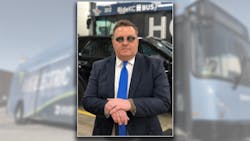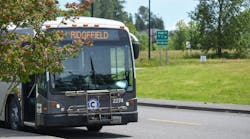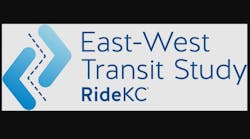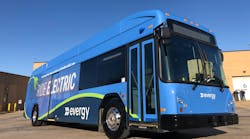The Kansas City Area Transportation Authority (KCATA) Board of Commissioners issued a statement July 27 that it had accepted the resignation of KCATA President and CEO Robbie Makinen.
The statement read:
“The board wants to express its appreciation for Robbie’s service to KCATA, first as a commissioner and then as its CEO. Under Robbie’s leadership, KCATA has been an innovator in public transit, expanding the mission of KCATA beyond bus service to include things like the RideKC Bike+Scooter program, and the Zero Fare initiative that all but eliminated fares for those using KCATA buses. These programs have led the nation in trying to arrest the effects of a changing climate, while also providing an equitable system for those who are most reliant on KCATA’s vehicles to get to their jobs, medical appointments and other needed destinations.
“KCATA’s Board wishes Robbie nothing but the best in his future endeavors."
Local Kansas City area news outlets reported Kansas City, Mo., city government officials had been pressuring the authority to remove Makinen based on what they saw as poor bus service and his push back against the city making KCATA pay $20 million for a street light project rather than on transit improvements. A closed-door session in June left his fate in limbo with confirmation arriving July 27 that Makinen was officially out at KCATA. The board did not name an interim president.
Makinen’s impact at KCATA
While his exit from the authority may be shadowed in discord, Makinen’s impact is easy to spot throughout the region and the transit industry.
He was appointed to the KCATA Board of Commissioners in 2007 to represent Jackson County, Mo., and remained in this role through 2015. He was named President and CEO of KCATA in 2016.
The transformation of regional transit under Makinen’s leadership began with bringing several different transit systems under the RideKC moniker where they now function as a regional network.
During his time at KCATA, the system saw the opening of the KC Streetcar in 2016 with the Main Street Extension and Riverfront Extension planned and a high capacity east-west connection being studied. The region also became a proving ground for bus rapid transit (BRT) with KCATA’s Main MAX opening in 2005, followed by Troost MAX in 2011, Prospect MAX in 2019 and the authority is studying BRT connecting downtown Kansas City, Mo., with downtown Independence, Mo.
In 2016, KCATA formed the first public-private collaboration to pilot on-demand services between the authority, Ford and Bridj to evaluate and share findings on mobility options and service adaptations. KCATA also launched RideKC Freedom On-Demand to provide service to those with disabilities and offering another transportation option for those who are not disabled.
Ensuring transit was accessible and equitable was a particular focus of Makinen’s while at KCATA. The authority developed a wayfinding app to assist blind and visually impaired transit customers navigate its system, partnered with the Veterans Community Project and the Greater Kansas City AFL-CIO to launch Veterans Pass, which allowed all who served free transit, and KCATA has been the industry benchmark for offering zero-fare services.
Last December, when President Joe Biden was promoting the impact of the Infrastructure Investment and Jobs Act (IIJA) to transit, he visited Kansas City and KCATA to put a spotlight on the authority’s “zero fare, zero emissions” plan.
KCATA was recently recognized by the American Public Transportation Association with the 2022 Outstanding Public Transportation System Achievement Award, which said the authority’s efforts have helped change “the local, regional and national transit landscape.”




![Federal, municipal and transit officials marked the start of track construction for the Main Street Extension of the KC Streetcar on April 6. [KC Streetcar Authority] Federal, municipal and transit officials marked the start of track construction for the Main Street Extension of the KC Streetcar on April 6. [KC Streetcar Authority]](https://img.masstransitmag.com/files/base/cygnus/mass/image/2022/04/16x9/KCStreetcarAuthority_MainStExtgroundbreaking.624ef78f9bbb7.png?auto=format,compress&fit=crop&q=45&h=139&height=139&w=250&width=250)



